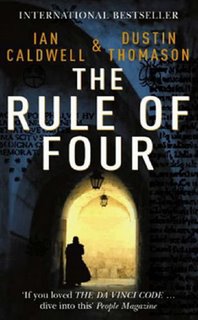
Authors: Ian Caldwell & Dustin Thomason
ISBN # 0099451956
521 pages Tom Sullivan, about to graduate from Princeton, is haunted by the violent death of his father, an academic who devoted his life to one of the rarest, most complex books in the world. Coded in seven languages, the Hypnerotomachia Poliphili, an intricate mathematical mystery and a tale of love and arcane brutality, has baffled scholars since 1499. Tom's friend, Paul, is similarly obsessed and when a long-lost diary surfaces they finally seem to make a breakthrough. Only hours later, a fellow researcher is murdered and the two friends suddenly find themselves in great danger. Working desperately to expose the book's secret, they slowly uncover a Renaissance tale of passion and blood, a hidden crypt and a secret worth dying to protect...
Dubbed “The Da Vinci Code for people with brains,” the back cover screamed a promise that wasn’t really, in my opinion, kept. Yes, it was an interesting story, but much of the action is kept from the readers’ view & we only see the answers, not the puzzle itself.
The writing style was a little stilted, possibly the result of having two authors working together on the project; there were moments where the joins weren’t quite as seamless as they could have been, but it didn’t really detract from the tale.
The Hypnerotomachia Poliphili is obviously a book very close to their hearts & I suspect their own college dissertations may have involved it, perhaps providing them with the inspiration for The Rule of Four. The story really focuses more on the relationships between the four friends; Tom, Paul, Charlie & Gil, so it’s a bit of a disappointment that I didn’t feel any real connection with any of those characters – I didn’t feel I got to know them at all with the exception of Tom, & that was only because the story was being told from his point of view. The dual themes of obsession & betrayal were of more interest to me, so it was a shame more wasn’t made of them instead, other than to show how the book manages to draw people into it.
All in all, this was a more challenging read than Dan Brown’s The Da Vinci Code, but slightly less satisfying. I think that given time, this writing duo will go far & that their storytelling skills will be more finely tuned the longer they work together, should they choose to take that direction, although I’d be interested in seeing what they can do on their own steam & seeing which voice flavoured this particular offering more.
Rating 6/10
 Authors: Ian Caldwell & Dustin Thomason
Authors: Ian Caldwell & Dustin Thomason Authors: Ian Caldwell & Dustin Thomason
Authors: Ian Caldwell & Dustin Thomason
0 Comments:
Post a Comment
<< Home